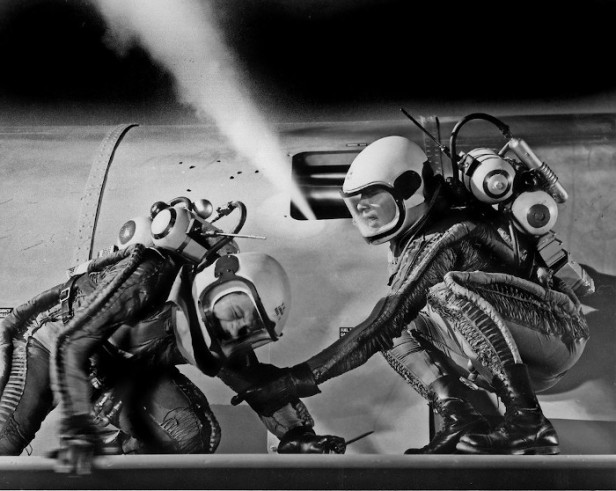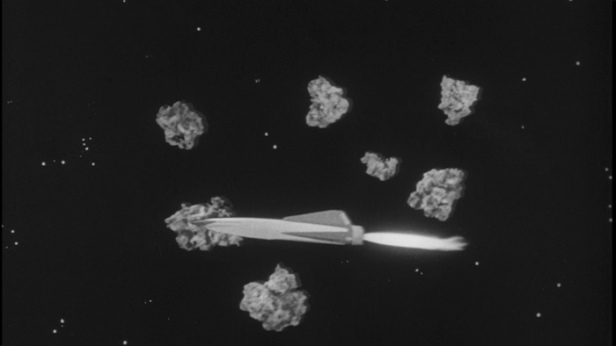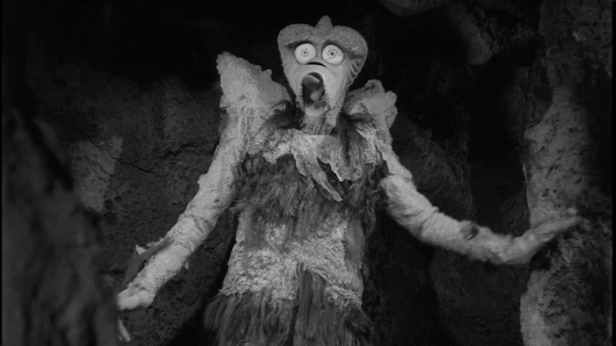William Marshall’s The Phantom Planet is a banal space travel adventure that begins with a trite, technobabble-laden narration and never improves from there. Marshall was a former bandleader and actor (he’s not the same one that later took the title role in Blacula (1972)) turned director whose career behind the camera was cut short by this lacklustre effort (he’d only previously directed two other films, Adventures of Captain Fabian (1951) and Hello God (1951).
In 1980, the US Air Force’s Space Exploration Wing is planning a mission to Mars from its moon base when the spaceship Pegasus goes missing. Captain Frank Chapman (Dean Fredericks) and navigator Lt. Ray Makonnen (Richard Weber) are sent to investigate but an encounter with a meteor shower and a subsequent space-walk accident leaves Makonnen drifting off to his death in deep space and an unconscious Chapman trapped in the ship with communications dead and with no choice but to attempt a landing on a nearby mysterious asteroid, the eponymous “phantom planet.” Exposed to the atmosphere of the asteroid – which he later learns is named Rheton – Chapman is shrunk to the same size as the inhabitants and is told that he will never be able to leave. He finds himself torn between two local women, Liara (Coleen Gray), the daughter of Rheton’s aged leader Sesom [^1] (Francis X. Bushman) and the mute Zetha (Dolores Faith), angers Liara’s suitor Herron (Anthony Dexter), fights a duel, is put on trial )the sharp eyed might spot Angelique Pettyjohn among the jurors) and works out why Rheton is seemingly wandering aimlessly through the universe – the asteroid is being attacked by another alien race, the Solarites who are trying to steal Rheton gravitational control technology.

There’s a lot going on in The Phantom Planet and as is all too often the way too much of it is of no particular interest. Despite the ludicrous plot – which often resembles the first draft of an unmemorable Star Trek episode cross-pollinated with an episode from a Flash Gordon serial – everyone treats the script with amusingly po-faced seriousness. It’s galling when writers, director and actors don’t take science fiction seriously, poking fun at a genre they believe is beneath them but it’s equally irritating when they take sub-standard material so seriously. There’s nothing in William Telaak, Fred De Gorter and Fred Gebhardt’s screenplay that warrants this sort of earnestness – it’s clear from the off that they don’t actually understand the science and the technobabble they’re writing and they simply end up penning gibberish (“Here we are able to translate all languages through voice tone waves”) or worthless philosophical platitudes (“You know, Captain, every year of my life I grow more and more convinced that the wisest and best is to fix our attention on the good and the beautiful. If you just take the time to look at it.”)
The script is also suffused with that obsession of American 50s and 60s science fiction with the human race becoming “soft and lazy,” an obsession with work over leisure and a fear that too much free time will lead to anarchy and chaos. There’s a feeling of being lectured at, chastised for not puling your weight that isn’t unique to The Phantom Planet but which because the film has so little else to offer, gets thrown into sharper relief here. Elsewhere the big book of science fiction movie clichés is plundered remorselessly – we get the inevitable love triangle (actually more of a love rectangle this time), contrived accidents thrown in to propel the plot forward and the never-welcome “the beginning” caption at the end of the film.

The special effects are about what you’d expect from a film of this vintage and stature. They occasionally pass muster but most of the time demand a suspension of disbelief that might be beyond the average viewer who has a right to expect something a bit more believable. But there’s no amount of disbelief suspending that’s going to make the Solarite seem realistic. Played by future Bond villain Richard Kiel in a ludicrous suit, the Solarite is a doleful looking monster that stumbles around uncertainly (one assumes that Keil couldn’t actually see out of the costume and was gingerly feeling his way around the set trying not to trip over anything) and which, in close-up, often disconcertingly resembles a half-melted Bertie Bassett.
The cast struggle gamely with all this nonsense but are let down at every turn. Dean Fredericks is an unvarnished plank of wood throughout, never making anything of the terrible dialogue while poor Coleen Gray gets saddled with info-dump duties, much of her dialogue involving her explaining to Fredericks (and the audience) the back story. Francis X. Bushman, a veteran from the silent period, once upon a time hailed as both “The Handsomest Man in the World” and “the King of Movies,” is here reduced to visibly reciting his dialogue from cue cards, a sad come-down for one of the most popular actors of his day. But sadly even this wasn’t quite the bottom of the barrel – his last screen outing would be Don Weis’ The Ghost in the Invisible Bikini (1966).

On the plus side, Walter Dick and Hayes Pagel get an endearingly above-their-station credit for “interplanetary sound” – essentially they supplied the sound effects – and there’s a charmingly surreal bit of business when Chapman first crashes on Rheton and after some wibbly wobbly flashbacks, is approached, Gulliver-like, by the tiny inhabitants of the asteroid. After breathing Rheton’s atmosphere he then shrinks inside his space suit. Don’t try to make any sense of it (and the writers play their “get-out-of-jail-free” card late in the day, revealing that breathing normal oxygen will restore him to his old self) just enjoy the pleasing weirdness of the moment.
But overall, The Phantom Planet is a cheap and undistinguished film, recycling Leith Stevens’ score from World Without End (1956) and its sets, costumes and special effects from the television series Men Into Space (1959-1960). There’s nothing here you haven’t seen done so much better many times before and since and it can only be recommended for those hardy souls who simply have to see everything that science fiction cinema has to offer.
[^1] “Sesom” is “Moses” spelled backwards but that seems to have little impact on the plot.